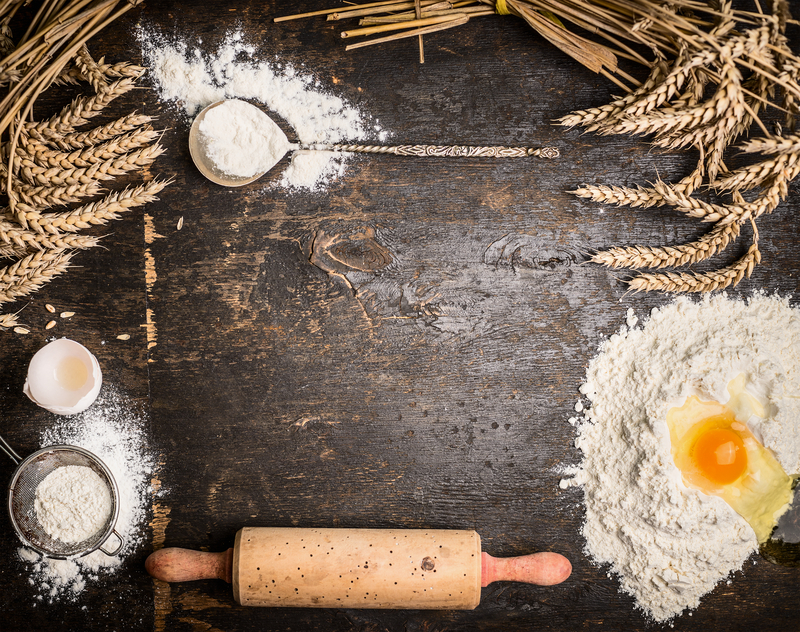 Baking is both an art and a science, and the choice of flour plays a crucial role in determining the success of your culinary creations.
Baking is both an art and a science, and the choice of flour plays a crucial role in determining the success of your culinary creations.
With numerous types of flours available in the market, selecting the right one can be a daunting task.
This article aims to guide you through the world of flours, helping you understand the characteristics of different types and ultimately choosing the best flour for all your baking endeavors.
All-Purpose Flour
All-purpose flour, as the name suggests, is a versatile option suitable for a wide range of baking applications.
It is made from a blend of hard and soft wheat, providing a moderate protein content.
This makes all-purpose flour suitable for making everything from cookies and cakes to bread and pastries.
If you’re a casual baker and prefer having only one type of flour in your pantry, all-purpose flour is an excellent choice.
Bread Flour
Bread flour is specially formulated for yeast-based baking, making it ideal for bread and pizza dough.
It has a higher protein content than all-purpose flour, typically around 12-14%.
The increased protein helps create a strong gluten network, resulting in a chewy and elastic texture in bread.
If you’re passionate about perfecting your artisanal bread, bread flour is the key to achieving that desired structure.
Cake Flour
Cake flour is milled from soft wheat and has a lower protein content, usually around 7-9%.
This lower protein content produces a more delicate crumb texture, making it perfect for light and fluffy cakes.
If you’re aiming for a tender and fine-textured cake, cake flour is the go-to choice. It’s also suitable for delicate pastries like biscuits and scones.
Whole Wheat Flour
For a healthier option, consider incorporating whole wheat flour into your baking.
Unlike refined flours, whole wheat flour retains the bran and germ, providing added fiber and nutrients.
Keep in mind that whole wheat flour has a nuttier flavor and a denser texture, so it might require adjustments to recipes for the best results.
Pastry Flour
Pastry flour falls between all-purpose flour and cake flour in terms of protein content, typically ranging from 9-10%.
It strikes a balance, making it suitable for various pastries, pie crusts, and cookies.
If you enjoy baking a variety of desserts and want a flour that can handle different recipes, pastry flour might be the perfect compromise.
Is there a Flour That Can Be Used for Everything?
 While there isn’t a single flour that can perfectly cover every baking need, all-purpose flour comes close to being the most versatile option for a wide range of recipes.
While there isn’t a single flour that can perfectly cover every baking need, all-purpose flour comes close to being the most versatile option for a wide range of recipes.
All-purpose flour is a blend of hard and soft wheat, offering a moderate protein content that makes it suitable for various baked goods.
Here are some reasons why all-purpose flour is often considered a go-to choice for many bakers:
- Versatility
All-purpose flour can be used in a variety of recipes, including cookies, cakes, muffins, pancakes, and even some bread recipes.
Its balanced protein content makes it a good compromise for different baking needs.
- Texture
All-purpose flour strikes a balance between high-protein bread flour and low-protein cake flour, resulting in a versatile texture that works well in a broad spectrum of baked goods.
It can produce a tender crumb in cakes and provide enough structure for cookies and bread.
- Availability
All-purpose flour is widely available in grocery stores, making it convenient for home bakers who may not want to stock multiple types of flour in their pantry.
- Consistency
Using all-purpose flour provides a level of consistency in your baking.
While specialty flours may excel in specific applications, all-purpose flour offers a reliable option across various recipes.
However, it’s essential to note that certain recipes might benefit from using more specialized flours.
For example, if you are passionate about artisan bread, you might find using bread flour enhances the structure and chewiness of the final product.
Similarly, if you’re aiming for delicate pastries, cake flour could be the preferred choice.
Ultimately, maintaining a diverse selection of flours in your pantry provides the opportunity for experimentation and customization to align with your specific baking preferences.
For a highly recommended all-purpose flour option, consider Pillsbury All-Purpose Flour.
Pillsbury takes pride in delivering consistent quality with every bag of All-Purpose Flour.
The finely milled flour ensures uniformity, contributing to the success of your favorite recipes time and time again.
This reliability has made Pillsbury a household name, synonymous with the satisfaction of home-baked goodness.
While all-purpose flour is a versatile and convenient option, exploring other flours can add depth and nuance to your baked goods.
Bottom Line – Choosing the Best Flour for All Your Baking Needs
In the world of baking, the choice of flour is pivotal to achieving the desired texture and taste in your creations.
While each type of flour has its specific strengths, the best flour for all baking largely depends on your preferences and the recipes you frequently use.
Having a variety of flours in your pantry allows you to experiment and tailor your baking to perfection.
So, the next time you embark on a baking adventure, consider the unique characteristics of each flour to elevate your culinary delights.


